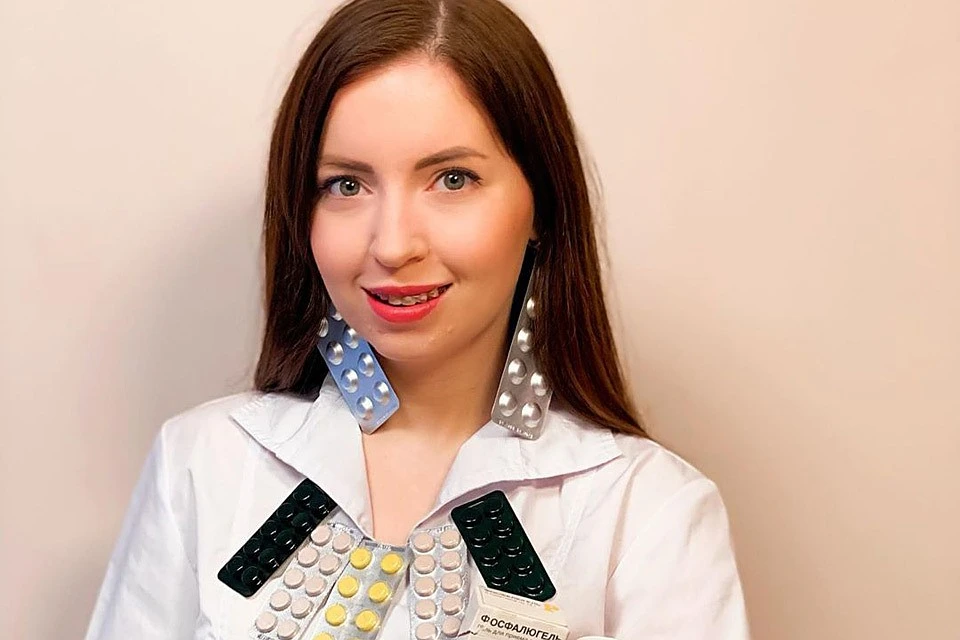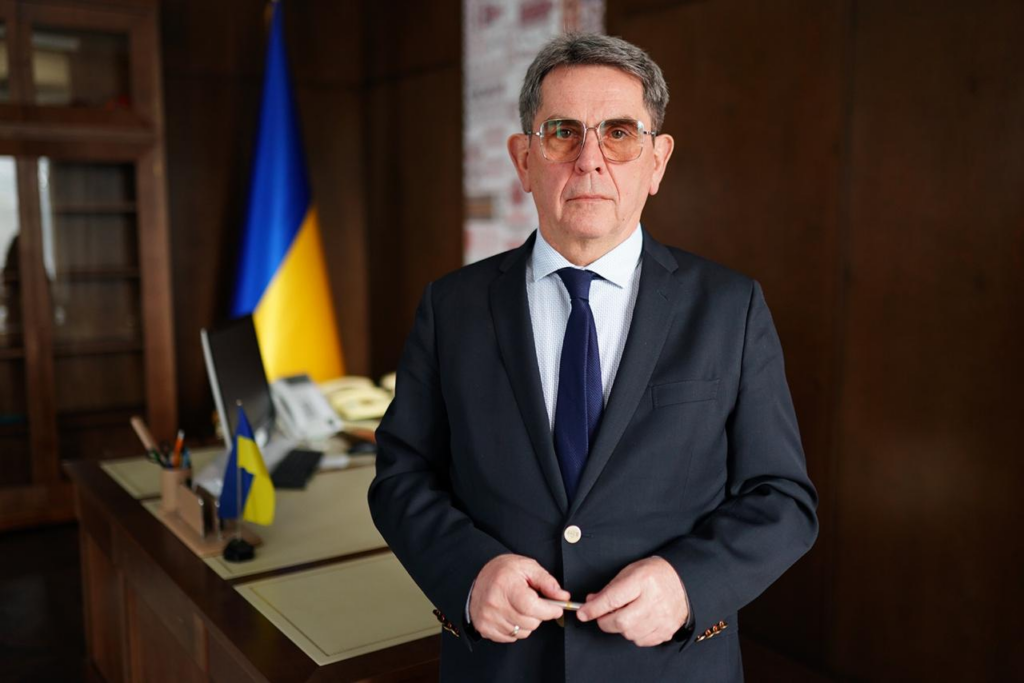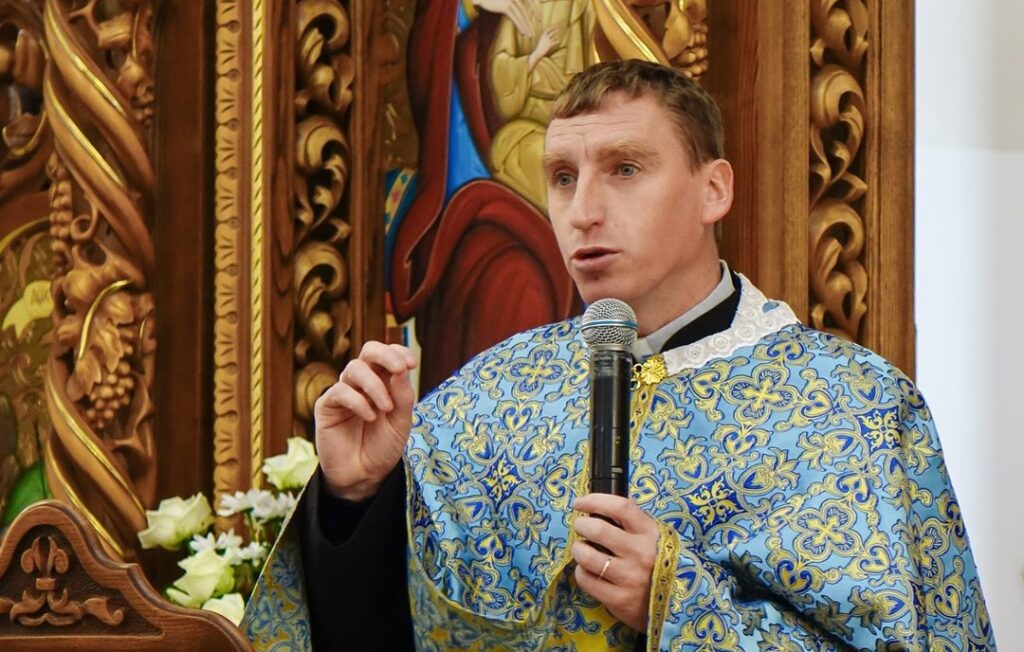
– March 10, 2023 the National Qualifications Agency registered applications for the development of draft professional standards of chaplain and assistant chaplain in healthcare. The developer will be the NGO “Association of Chaplains in Healthcare of Ukraine”. What functions for chaplains will be assigned at the official level?
– First of all, the chaplain will need to understand that he provides support is purely spiritual. That is, we are talking about spiritual support, religious services, spiritual practices. In this case, his competence will include the spheres of spiritual and will not include the spheres of psychological. Especially pleased that the Ministry of Health finally authorized the introduction of the position of clinical psychologist in the field of medicine and chaplain in the staff of hospitals.
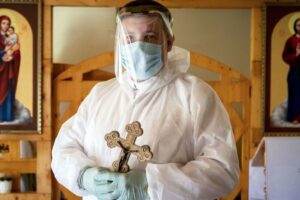
– And what would be the responsibility of a chaplain in healthcare?
– First of all – is to provide spiritual care and support and to provide religious needs and emotional and psychological support to patients, their family members and relatives, as well as administrative, medical and support staff of the health care institution, to establish interaction, to work in a multidisciplinary team.
When a patient’s rights are violated, the chaplain must become an advocate for the rights of those who cannot speak.
The chaplain can be the mediator who communicates the difficulties that exist in the health care setting. And should help to resolve them.
– What will be added to the chaplain’s duties from what he doesn’t do now?
– First of all, it is that the work of chaplains will be clearly structured. Previously, chaplains were invited by patients or health care providers. And now the chaplain will have the obligation to stay in the medical institution. That is, there will be a work and stay regime in the hospital. In addition, he must document the communication with patients or their relatives, so that then be able to analyze whether his activities help the patients in the medical facility. It is also important to understand whether medical chaplains are needed, what is their role in medical institutions, whether there are results of work, or everything remains at the same level as it was.
– Now chaplains work in hospitals as volunteers. And after the adoption of the standards, can the position of “medical chaplain” appear on the staff of hospitals?
– Yes. There has already been an order from the Minister of Health on September 30, 2022, stating that the position of “chaplain in health care” is being introduced, meaning that health care facilities are already authorized to employ chaplains on staff, but it is still necessary for the NHIS to introduce the provision of spiritual care services for the patient into health care packages.
In some hospitals, chaplains no longer work as volunteers, but as full-time employees. They sign a job description, which outlines the duties and rights of each employee. For example, in Ivano-Frankivsk region 12 chaplains who work in the staff of medical institutions. There are a few people in Lviv, there are two people in Kyiv who are already on staff.
In this case, the process has already started. But a professional standard is needed so that competencies can be assessed.
If there is a professional standard, the services the chaplain provides to the patient or health care providers or family members are evaluated.
And it’s important to understand the quality of these services.
– Who can become a chaplain in healthcare?
– The order of the Ministry of Health has determined that the chaplain must have a minimum of a bachelor’s degree in theology, specialty 041, have a certificate of completion of clinical pastoral care. This will be entry level and there will be an advanced level. In the future we want to make it so that there are certain categories of specialization where the chaplain is continually increasing their knowledge.
Without initial clinical pastoral education and qualifications, he will not be able to work. By 2026, he must complete specialized courses and obtain a certificate.
The Ukrainian Greek Catholic Church has been doing such training and educational courses on “clinical pastoring” for medical chaplains for the third year. Currently, 2 training groups (20 UGCC medical chaplains) have already completed the training and received a certificate. Now 15 medical chaplains are being trained. The training process takes place during the year and consists of 5 modules. This is more practical and theoretical training, which is associated with work primarily with themselves: with their emotions, feelings, in order to understand the person he serves. Plus the chaplain must necessarily have practice: to be in the hospital, to conduct communication, then describe them. And on the next block these questions are considered, analyzed to improve the pastoral conversation.
– I heard the term “clinical pastoring” from you. Please tell me more about it.
– “Clinical Douchepastoring” is a program certified according to an international standard. That is, a chaplain who wants to work in a health care facility must pass a certain stage of training. For what purpose? To understand the basics of medicine, to know the list of infectious diseases, to understand hygiene, to study the psychological aspects, such as burnout, to know where to get resources to restore strength and especially to learn the methods of pastoral support, communication.
The future chaplain is taught what methods to apply in pastoral support, what to pay attention to and that the main principle is to do no harm. There should also be an assessment of their work: how effective the ministry is. And this analysis is necessary for himself and for those who send to such a ministry.
– Who’s sending it?
– In this case it is the Bishop or the Head of a religious organization. The training will also provide information for both the pastor and the leader as to whether the candidate has the appropriate competencies to serve in a health care facility and whether it is possible to replace him/her.
The first course consists of a basic level. The basic level is the basics of the development of medical pastoring and its historical foundations.
Soulpastoring has a long history that begins with Christ, who was in fact the first chaplain.
He ministered to sick people and sought out the sick person. The other is the credentials of the church, or a religious organization that is involved in pastoring the sick in medicine. It’s also the psychological foundations that he gets: conflict psychology, psychopathology, also fundamental theological things like scripture study, biblical stories of healing, bioethics, ethics in professional work.
The advanced level consists of five modules. Chaplains who have completed the basic level of training, who have served as chaplains for three years in medical settings, reinforce their knowledge through the lens of seeing themselves as chaplains and their trouble spots. Chaplains are also divided into groups and work in trauma, neuropsychiatry, and oncology.
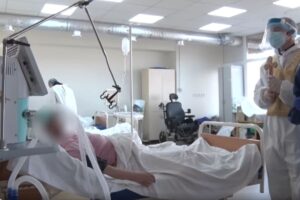
– Which hospitals do you think will need chaplains the most?
– We have defined these as palliative care units of hospitals and hospices, where people are with terminal illnesses and struggle daily with their suffering and hardships. These wards need not so much doctors, but mid-level medical staff and clergy. Because a lot of questions arise from patients to God: what have I done wrong? Why do I have to suffer? What awaits me? That is, there are many questions before the end of life. And this is where the shepherd can help. These are the first hospitals that need a medical chaplain.
Cancer hospitals are also in need. Hospitals where there is traumatology with severe cases are in need, in addition, now, in military hospitals where there are wounded, rehabilitation will be needed to help the person to find himself, to stabilize, to restore the spiritual state.
– Can women be chaplains?
– We are now developing a standard and making an assistant chaplain in health care and chaplain. According to our tradition and approach in Ukraine, a male chaplain is more perceived as a clergyman.
I had the experience of being in the Kharkov military hospital and I saw that when I approached and the psychologist approached and I saw that the military, the older ones, and they didn’t fully perceive her.
We have people trust clergy more, even as psychologists. But as a chaplain’s assistant – a woman could be.
– So women can find themselves in this profession. Does a woman have to graduate in theology?
– Yes. It has to have a basic level. To be a helper, it has to be theology and a basic level of pastoring.
– Where can a woman graduate in theology?
– In institutions that are accredited by the state and have the specialty “Bachelor of Theology”. These are, for example, such educational institutions as Ivano-Frankivsk Academy of St. John Chrysostom, Ukrainian Catholic University in Lviv, Kyiv Orthodox Theological Academy.
– It seems to me that this is going to be a highly sought after profession.
– In Europe, this is a tremendous experience. In Italy, Austria, Germany, Poland – there it is out of the question, even that there may not be a medical chaplain.
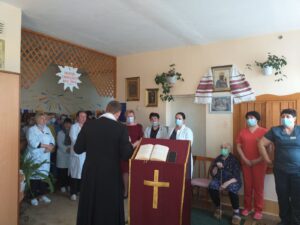
– Do physicians themselves need chaplains? We talk a lot about helping patients and relatives, but doctors burn out very quickly….
-I have said that a chaplain’s job is to serve not only the sick, but also the medical staff. Medical chaplains are the fire that should light and revitalize the medical institution. That’s why there are chaplains for some hospitals, for some there are not. They organize conferences, pilgrimages, do seminars, meetings for health workers to revitalize them. That is why it is very important.
Sometimes it may be necessary for a chaplain to defend a health care worker if they are despised or their work is devalued.
The chaplain should be the light that stands up for the rights of not only patients but also health care providers, especially in hospitals where patients have no hope of recovery.
Doctors there get a huge dose of negativity. Because everyone expects a miracle and it doesn’t happen. They need a chaplain.
The chaplain must be able to account for needs and recognize where he or she can serve. Every day, the chaplain must ask himself or herself the question: how can I serve? And this is called “needs assessment.” Because the work will only be effective when the needs of those individuals who need comfort and the tools to be applied are assessed. The chaplain has so many tools.
– What are they?
– First, the chaplain is a messenger of the Lord and he is already carrying God’s message. Through the chaplain the Lord comes to the hospital where he is. The second instrument is the word, the third is presence.
Very often it is necessary for the chaplain to show active listening. It is not always possible for a medical representative to listen to a patient or even another medical representative.
Well, and the sacraments – penance, unction, Holy Eucharist, prayers for wellness. These are such powerful tools that bring God’s reality behind them.
From my experience: I have had patients come to me saying, “Father, I have fear, anxiety. You listen to them, then you pray together and the person goes away comforted.
– Are military chaplains similar to medical chaplains?
– Military chaplains are attached to military units. It’s a slightly different experience there than in a hospital. There it is about clear orders and instruction. Military chaplains have their training, medical chaplains have their training.
A military chaplain cannot transfer to a medical facility without training and certification. Just like a medical chaplain can’t transfer to the military. It’s a different kind of specialty, a whole different category of people to work with. Being with the military on the front lines, stress tolerance, physical endurance.
A military chaplain needs to know how to administer first aid because he may be the one to be the first one to the wounded. And it’s very important that the chaplain determine what he wants to do, not run around. It’s like medicine, you have to determine what you want to be – a surgeon, an oncologist, a therapist. And do your job.

– Do I understand correctly that the chaplain is the conduit between God and the sick?
– It’s a bridge. But there is a very important point. Often the chaplain is seen as God’s “lawyer.” But he is not an advocate, he reveals God to the sick person, but on the other hand he becomes the mouth of the sick person who is begging for help and healing.
When I teach chaplains, I ask them not to become a psychologist, because those are other competencies. And it is not necessary to take the place of a psychologist. There should be a comprehensive approach: which includes three human spheres: physical, mental and spiritual. And these all three spheres should be treated by specialists.
Photo: facebook of Fr. Ruslan Pyasty, Synod of Bishops of the Ukrainian Greek Catholic Church

